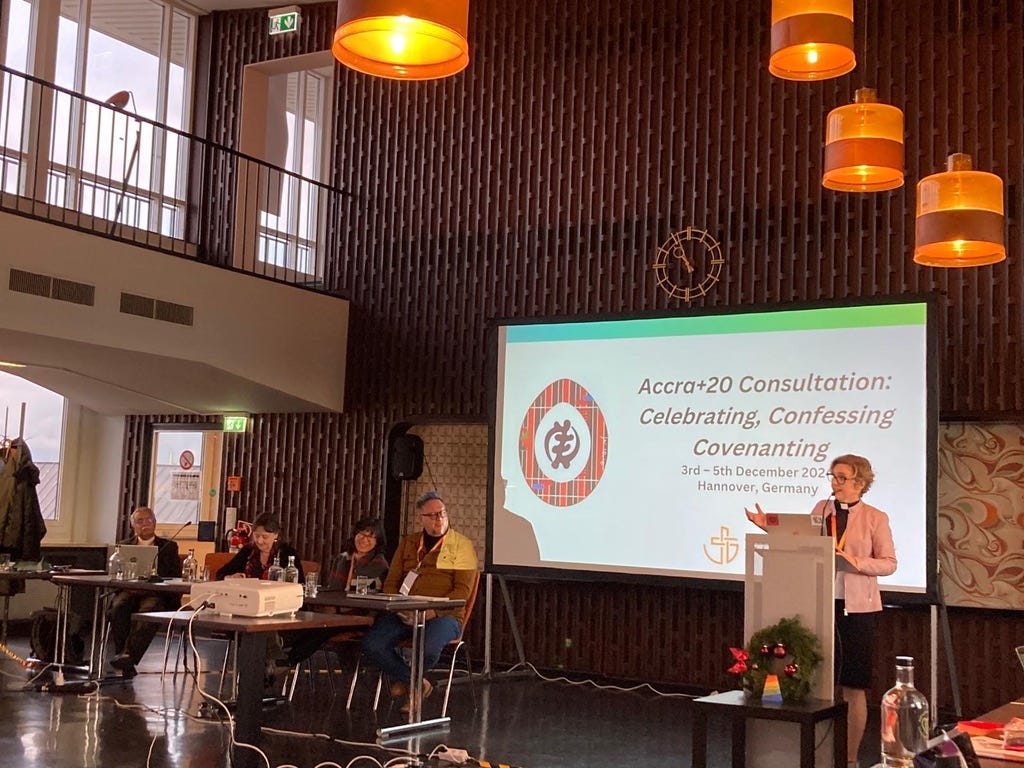Advent Series 2024: Waiting for God in the Climate Crisis - Week 3 - Joy in Sacrifice
Please join me for a series of Advent reflections and prayers in our time of climate crisis. Each post arrives on Friday in time for the following Sunday in Advent.
This is week three of my series of reflections and prayers for Advent this year. Scroll down to find this week’s offering! 🕯️
The Problematic Language of Stewardship

As I mentioned in last week’s newsletter, I gave a talk to the World Communion of Reformed Churches (WCRC) Accra+20 Consultation in Hannover, Germany, last week. My presentation will be published next spring, along with the other presenters’ work. Once it is available, I will send the link to all of you in this community.
We are in a climate and ecological crisis, and it’s all hands on deck... Subscribe to join a community of people of faith who care about climate action and find hope and encouragement at the same time!
In the meantime, I want to share a portion of my presentation that has wider relevance beyond the text of the Accra Confession and the work of the WCRC. Common to many Christian environmental writings is to draw on the language of ‘stewardship,’ the idea that we are called to wise ‘stewardship’ of God’s creation. It emerges from two key passages in the Bible:
“Then God said, ‘Let us make humankind in our image, according to our likeness; and let them have dominion over the fish of the sea, and over the birds of the air, and over the cattle, and over all the wild animals of the earth, and over every creeping thing that creeps upon the earth.’” (Gen. 1:26)
“The Lord God took the man and put him in the garden of Eden to till it and keep it.” (Gen. 2:15 NRSV)
The language of stewardship, however well-intentioned to move us away from a destructive understanding of dominion, is inadequate in the face of the climate and ecological crisis. The following excerpt from last week’s presentation begins to address the problems of stewardship language.
Have you read the Accra Confession? 20 years later, it is still a powerful text. Read it HERE.

Stewardship: The Problem of Language (an excerpt from Accra+20: Implications for Discipleship presented on December 4, 2024, Hannover Germany)
The problem of seeing creation as separate from human beings is reflected in the language of the Confession in other ways, too. There is a language that is used uncritically in the document and, again to be fair, in much of the church. We often draw on the notion of stewardship and call ourselves “stewards” of God’s creation, and see ourselves as “partners with God in creation.” However, the language of stewardship maintains a theology of human supremacy over nature, fails to recognize the value of the Earth community beyond its utility to human beings, and does not have the transformative potential that is needed for a radical discipleship of climate action.
The language of Christian stewardship is in line with the idea of “sustainable development” and has been soundly critiqued for the assumptions that we humans know all that is needed for the Earth community, and that we can function as God’s ‘managers’ of the natural world. Indeed, it is the language of empire, reinscribing the construct of dominance and power that the Confession otherwise rejects. And, the fact is that the language of stewardship just isn’t working; it has been around for a long time in the church and has failed to inspire the radical discipleship of climate action that we need now.
Stewardship language fails us as Christians in our discipleship because it fails to recognize an important theological truth: that God is present in all of life, and that creation exists for God’s purposes, not our own. And while the Confession is strong in recognizing that creation belongs to God, and acknowledges that creation “continues to groan for its liberation” it fails to develop the implications of this truth beyond what it means for human beings.
Postscript: There are many passages in the Bible that Bible scholars, theologians and Christian practitioners have determined need to be carefully interpreted and, as needed, criticized for the ways that they have been used to inflict oppression and harm on various groups of people, such as women, members of the LGBTQIA+ community, and more. The passages in Genesis quoted above have been used quite uncritically, but need further examination for how they have been used to inflict harm upon the Earth community.
ADVENT SERIES 2024:
Waiting for God in the Climate Crisis
This is Week 3. For this year’s Advent reflection series, I have chosen the theme of kenosis. Kenosis means self-emptying, about giving of the self for the sake of the other. It is an ancient metaphor and model in Christianity, yet it has illuminating potential for today. Kenosis is about the sacrifice that is required of us if we are to effectively respond to the climate and ecological crisis. More, it is in such sacrifice, in our self-emptying that we meet the other and find ourselves.
This Advent series is available to paid subscribers of Faith. Climate Crisis. Action. Upgrade today to receive the full devotional offering (as well as access to the entire archive of this newsletter). Each week includes a reflection on the Gospel reading for that week, questions for you to ponder, and a prayer written by me that you are invited to pray at any time during Advent. I hope that these resources are meaningful to you in this season of holy waiting.
Did you miss last week’s reflection? Here it is:
Week 1’s reflection is here:
(3) Third Week of Advent: Joy in Sacrifice
Keep reading with a 7-day free trial
Subscribe to Faith. Climate Crisis. Action. to keep reading this post and get 7 days of free access to the full post archives.







